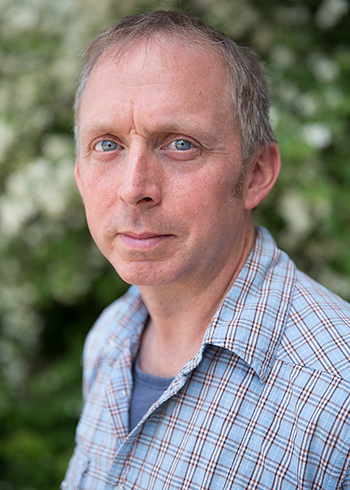
Andrew Woolford
Event reconstruction can be an enormous undertaking – consider the millions spent by producers on costuming and sets for films and theatrical productions; the years of research and interviewing done by the authors of biographies and history books.
Still, a new sort of reconstruction is on the rise now –virtual reality, for which users don goggles to view storyworlds developed by videographers, directors, programmers and sometimes researchers and historians.
Andrew Woolford, a professor of sociology and social justice at the University of Manitoba, is one researcher involved in the development of the Embodying Empathy Virtual Indian Residential School storyworld. The project walks viewers through a simulated Indian Residential School – just one of many where Indigenous children who’d been forcefully removed from their families and deprived of food, their ancestral languages and adequate sanitation were held.
“The world has been using a participant-led methodology through which every detail has been built in consultation with a group of Residential School survivors,” Woolford said. “The project’s innovation therefore lives not solely in its virtual storyworld, but also in its decolonizing or ‘unsettling’ methodology whereby ownership, access, control and possession of the project rest in the hands of the Indigenous governing council.”
Woolford, joined by research partners Adam Muller and Struan Sinclair, will present a paper on the challenges of the project in October at USC Shoah Foundation’s 2017 International Conference “Digital Approaches to Genocide Studies,” co-sponsored by the USC Mellon Digital Humanities Program. The two-day conference, which will be held at the University of Southern California in Los Angeles, invited scholars from across the globe to converge and discuss the relationship between digital methodologies, practices, ethics and the nature of contemporary Holocaust and Genocide Studies.
“When we saw the call for papers, it was a clear fit with our research,” Woolford said.
In its initial call for papers, USC Shoah Foundation asked academics to investigate the ways in which digital tools and methods, new media and information technologies can help us to challenge conventional wisdom regarding the Holocaust and Genocide Studies by raising new questions, improving our understandings, deepening our analyses, widening our fields of view and pioneering new approaches.
“Our hope is to learn from others who are also using immersive technologies to better connect secondary witnesses to various forms of suffering and who share our goals of fostering understanding and social action,” Woolford said. His team’s presentation will join a number of others on a variety of subjects, from an analysis of the netnography of digital autobiographical documentary to the capabilities of geographic information systems for analyzing Holocaust spaces, to the usefulness of augmented reality technologies in sharing the memories of places of genocide.
First and foremost, Woolford intends for his team’s project to serve the goals of the survivors with whom they are working, many of whom were abused with forced labor and adherence to the Christian faith in these camps and emerged with post-traumatic stress, alcoholism and substance abuse problems.
“A fundamental principal of decolonizing research is that is it driven by community needs rather than researcher goals,” Woolford said. “In this case, the goals of the survivors coincide with the needs of the field, where more efforts at community-led research are essential. The survivors want to know that their stories and experiences will be preserved and shared with upcoming generations; we want to know if virtual technologies provide an effective means for transmitting this information across generations.”
To determine this, Woolford and his associates will run students through the storyworld and apply a variety of measures to assess its ability to foster empathy and provide new information.
As criminology research coordinator at the University of Manitoba and former president of the International Association of Genocide Scholars, Woolford is uniquely qualified to conduct such tests. The author of several works, his Fulbright project, co-funded by the Truth or Reconciliation Commission of Canada, was on boarding and residential schools and colonial genocide in the United States and Canada. It has recently been published as This Benevolent Experiment: Boarding Schools, Genocide and Redress in North America.
While he’s been working on the Embodying Empathy project, Woolford’s also been tackling a project called Remembering Assiniboia, which will generate and develop an archive and memorial for the Assiniboia Resident School by hosting a reunion for former students.
Now that he’s been pulled into USC Shoah Foundation’s sphere, Woolford looks forward to using all of the Institute’s resources.
“There is so much value,” Woolford said. “I am very eager to explore the Visual History Archive. For my purposes in particular, I am looking for inspiration for communication of residential school history and testimony, as the Canadian National Centre for Truth and Reconciliation is working to make available the information collected by the Truth and Reconciliation Commission of Canada.”
He’ll also be introducing the Archive to his graduate students.